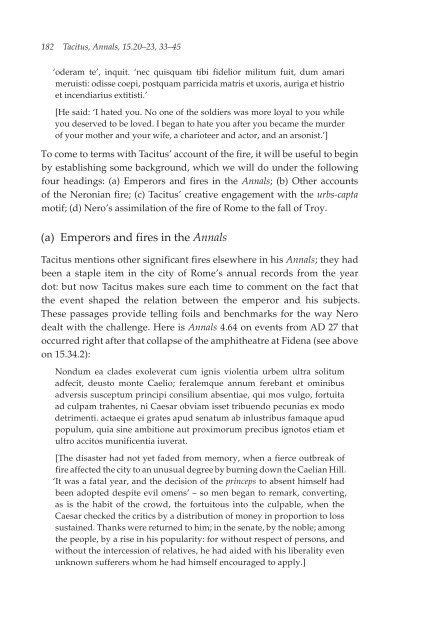Tacitus, Annals, 15.20-23, 33-45. Latin Text, Study Aids with Vocabulary, and Commentary, 2013a
Tacitus, Annals, 15.20-23, 33-45. Latin Text, Study Aids with Vocabulary, and Commentary, 2013a
Tacitus, Annals, 15.20-23, 33-45. Latin Text, Study Aids with Vocabulary, and Commentary, 2013a
You also want an ePaper? Increase the reach of your titles
YUMPU automatically turns print PDFs into web optimized ePapers that Google loves.
‘oderam te’, inquit. ‘nec quisquam tibi fidelior militum fuit, dum amari<br />
meruisti: odisse coepi, postquam parricida matris et uxoris, auriga et histrio<br />
et incendiarius extitisti.’<br />
[He said: ‘I hated you. No one of the soldiers was more loyal to you while<br />
you deserved to be loved. I began to hate you after you became the murder<br />
of your mother <strong>and</strong> your wife, a charioteer <strong>and</strong> actor, <strong>and</strong> an arsonist.’]<br />
To come to terms <strong>with</strong> <strong>Tacitus</strong>’ account of the fire, it will be useful to begin<br />
by establishing some background, which we will do under the following<br />
four headings: (a) Emperors <strong>and</strong> fires in the <strong>Annals</strong>; (b) Other accounts<br />
of the Neronian fire; (c) <strong>Tacitus</strong>’ creative engagement <strong>with</strong> the urbs-capta<br />
motif; (d) Nero’s assimilation of the fire of Rome to the fall of Troy.<br />
<strong>Annals</strong><br />
<strong>Tacitus</strong> mentions other significant fires elsewhere in his <strong>Annals</strong>; they had<br />
been a staple item in the city of Rome’s annual records from the year<br />
dot: but now <strong>Tacitus</strong> makes sure each time to comment on the fact that<br />
the event shaped the relation between the emperor <strong>and</strong> his subjects.<br />
These passages provide telling foils <strong>and</strong> benchmarks for the way Nero<br />
dealt <strong>with</strong> the challenge. Here is <strong>Annals</strong> 4.64 on events from AD 27 that<br />
occurred right after that collapse of the amphitheatre at Fidena (see above<br />
on 15.34.2):<br />
Nondum ea clades exoleverat cum ignis violentia urbem ultra solitum<br />
adfecit, deusto monte Caelio; feralemque annum ferebant et ominibus<br />
adversis susceptum principi consilium absentiae, qui mos vulgo, fortuita<br />
ad culpam trahentes, ni Caesar obviam isset tribuendo pecunias ex modo<br />
detrimenti. actaeque ei grates apud senatum ab inlustribus famaque apud<br />
populum, quia sine ambitione aut proximorum precibus ignotos etiam et<br />
ultro accitos munificentia iuverat.<br />
[The disaster had not yet faded from memory, when a fierce outbreak of<br />
fire affected the city to an unusual degree by burning down the Caelian Hill.<br />
‘It was a fatal year, <strong>and</strong> the decision of the princeps to absent himself had<br />
been adopted despite evil omens’ – so men began to remark, converting,<br />
as is the habit of the crowd, the fortuitous into the culpable, when the<br />
Caesar checked the critics by a distribution of money in proportion to loss<br />
sustained. Thanks were returned to him; in the senate, by the noble; among<br />
the people, by a rise in his popularity: for <strong>with</strong>out respect of persons, <strong>and</strong><br />
<strong>with</strong>out the intercession of relatives, he had aided <strong>with</strong> his liberality even<br />
unknown sufferers whom he had himself encouraged to apply.]


















